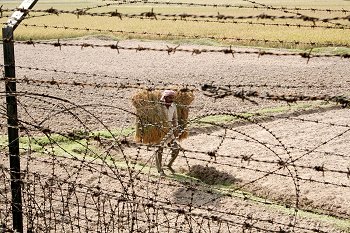SC Slams Assam Govt for 'Vague' Affidavit on Illegal Migration
Fencing the porous India- Bangladesh border

NEW DELHI: The Assam government was lambasted by the Supreme Court on Tuesday for “dragging its feet” over addressing the “massive” and serious issue of illegal Bangladeshi migration into the state through the porous border.
The apex court also rejected the “vague” and “highly unsatisfactory” affidavit filed by the state government on the measures taken to tackle the issue and has directed the Chief Secretary to tender a fresh affidavit in the next 10 days.
Expressing “displeasure over the conduct of the state government”, a bench of Justices Ranjan Gogoi and R F Nariman questioned their “seriousness” 0ver the issue and the implementation of the SC’s December 17,2014 orders in this regard. The December 17 judgement was the third in a series on this issue of influx.
Additionally, the bench was furious at the half-baked affidavit by a junior officer. Pulling up the state's counsel, the bench said, "You get hold of anyone on the street and ask him to file an affidavit before the highest court? What does he know about the ground reality? Should we call him and test his knowledge?" and refused to accept the affidavit.
"You have not addressed the issues with the seriousness it requires. You have been dragging your feet for years and years and still you are dragging," the bench said; adding that filed affidavit is “highly unsatisfactory” and “we refuse to accept it”.
The bench directed the Chief Secretary to file a "meaningful affidavit" within a week on the steps taken in pursuant to its December 17 judgement and added that the failure to file a proper affidavit would lead to calling the state's Chief Secretary for explanation.
Further, the bench asked Additional Solicitor General Neeraj Kishan Kaul to file the Centre's affidavit in 10 days detailing the work in progress for fencing the border with Bangladesh, building roads in border areas and increasing patrolling to stop illegal migration from Bangladesh into Assam and neighbouring states. The Centre was particularly asked to spell out the "scheme for deportation" of illegal migrants and the matter was posted after two weeks.
The court had earlier asked the Centre to detect and deport all illegal migrants who had come to Assam after March 25, 1971. It had, however, stated that the foreigners, who came to India between January 1, 1966 to March 24, 1971, may be awarded citizenship as per law.
In the December 2014 judgment that was talked about, the bench of Justices Gogoi and Nariman had referred the issue whether Assam faced "external aggression and internal disturbance" because of massive influx of illegal Bangladeshi migrants to a five-judge constitution bench .
The bench had, however, agreed that Assam faced tumultuous cultural and demographic changes because of the massive influx and had thus directed the Centre to talk to the neighbouring country in order to streamline procedures for deportation of illegal migrants.
A cardinal question was asked by the bench then. "We are at a loss to understand why 67 years after Independence, the eastern border is left porous," it had said adding, "We have been reliably informed that the entire western border with Pakistan being 3300-kms-long, is not only properly fenced but properly manned as well and is not porous at any point."
It had, therefore, directed the government to effectively fence the Indo-Bangladesh border while maintaining strict vigil through effective patrolling to prevent influx of illegal migrants. The fencing process was decided to monitor periodically and the bench had sought periodic reports on this from both Assam as well as the Centre.
Alongside, the bench had also asserted that the vigil along the riverine boundary should be "effectively maintained by continuous patrolling. "Such part of the international border which has been perceived to be inhospitable on account of the difficult terrain will be patrolled and monitored at vulnerable points that could provide means of illegal entry."
The apex court had also directed that motorable roads alongside the international border, wherever incomplete or have not yet been built, should be laid so as to enable effective and intensive patrolling.
The December 2014 judgement had come on the petition filed by the Assam Sanmilita Mahasangha, Assam Public Works and All Assam Ahom Association in the aftermath of large-scale riots in the year 2012 and in 2014 in the state.



